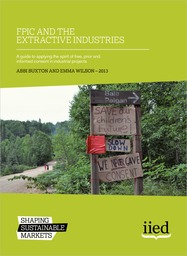Focal point
Location
Mission
Our mission is to build a fairer, more sustainable world, using evidence, action and influence in partnership with others.
Who we are
IIED is one of the world’s most influential international development and environment policy research organisations. Founded in 1971 by economist Barbara Ward, who forged the concept and cause of sustainable development, we work with partners on five continents. We build bridges between policy and practice, rich and poor communities, the government and private sector, and across diverse interest groups. We contribute to many international policy processes and frameworks, including the Intergovernmental Panel on Climate Change, the Millennium Ecosystem Assessment and the UN conventions on climate change and biological diversity.
What we do
IIED carries out research, advice and advocacy work. We carry out action research — generating robust evidence and know-how that is informed by a practical perspective acquired through hands-on research with grassroots partners — and we publish in journals and maintain high research standards. We advise government, business and development agencies, and we argue for changes in public policy. We focus on bottom-up solutions, stay open to flexible, adaptable solutions and are marked by a tradition of challenging conventional wisdom through original thinking.
Resources
Displaying 256 - 260 of 367FPIC and the Extractive Industries - A guide to applying the spirit of free, prior and informed consent in industrial projects
This guide offers a three-point framework for companies seeking to integrate FPIC principles into their policies and apply them in the operations. This includes
• complying with the requirements for FPIC under international and national law,
• implementing FPIC principles throughout the project life-cycle, and
• extending FPIC processes to all project-affected communities in line with good practice guidance. It also seeks to
• articulate the relevance of FPIC to company policy and practice, and
EITI and sustainable development: Lessons and new challenges for the Caspian region
The Extractive Industries Transparency Initiative (EITI) is sparking renewed interest and debate on issues such as transparency of government – company contracts, reporting on revenues from natural resources by company and by project, and reporting on revenue expenditure.
Tipping the Balance. Policies to shape agricultural investments and markets in favour of small-scale farmers
Based on case studies in Guatemala, Nigeria, Tanzania and the Philippines. Contains introduction: shaping agricultural investments and markets for inclusion; getting the basics right: the wider policy environment; policies for inclusive agricultural investment and inclusive market governance; conclusions: policy and advocacy priorities for inclusive agricultural investments and market development.
Long-term outcomes of agricultural investments: Lessons from Zambia
Discusses two agricultural investments in Zambia. Both projects started as state-led, development-oriented initiatives in the 1970s and early 1980s, and were later privatised. This long implementation history provides an opportunity to assess the longer-term socio-economic outcomes of agricultural investments, and to distil insights on practical ways to include lower-income groups in investment processes. Includes national context, design and implementation of the investment projects, and socio-economic outcomes.
Tipping the Balance. Policies to shape agricultural investments and markets in favour of small-scale farmers
Based on case studies in Guatemala, Nigeria, Tanzania and the Philippines. Contains introduction: shaping agricultural investments and markets for inclusion; getting the basics right: the wider policy environment; policies for inclusive agricultural investment and inclusive market governance; conclusions: policy and advocacy priorities for inclusive agricultural investments and market development.






